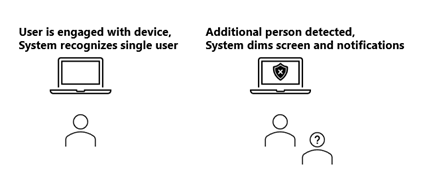Note
Access to this page requires authorization. You can try signing in or changing directories.
Access to this page requires authorization. You can try changing directories.
This section provides an overview of the various experiences enabled by Windows 11's presence sensing features. Each experience can be enabled independently, however Microsoft encourages the implementation of as many of these features as possible for a given hardware configuration.
Functional overview

There are three proposed features that will leverage the multi-person detection sensor.
Onlooker Detection Dim: When an additional presence is detected by the device, the display will dim to increase privacy.
Onlooker Detection Alert: When an additional presence is detected by the device, a windows notification will trigger to notify the user of an onlooker.
Onlooker Detection Back On Mode: When the feature is turned off, the user has the option to automatically reactivate the feature after a configurable duration.
Debounce mechanisms
Secondary presence is repeatedly moving in and out of the multi-person detection threshold
The state machine will wait at least 5 seconds between human presence dimming to prevent the system from repeatedly switching between multi-person state and single person state.
Hysteresis is provided at the OS service layer and this should be taken into account. The OS service will not take into account device-level hysteresis.
Exceptions
It is expected that this feature will operate in an analogous manner to Adaptive Dimming, there will be OEM customizations for Dim Level, and Dim Timeouts.
Holistic experience benchmarks
This section defines what the user should experience when using this feature, regardless of the hardware facilitating the experience.
| Measure | Metric | Comments |
|---|---|---|
| “Accuracy” – User Intent Recognition | >95% Pass Rate (determined by number of successful Test executions divided by total executions) for each scenario | Defined as the time between when the user reaches the distance directly measured (defined below) at 45 cm (18 in), 75 cm (29.5 in), and 120 cm (47.2 in) and the time when the device's screen turns on. Average of the three trials. |
| Multi-person Detection Latency -Average | <7 seconds (2 seconds for the sensor and 5 seconds for the OS debounce timer) | This is subject to change based on experimentation and further user research studies |
| Multi-person Detection Latency – Maximum | <10 seconds (5 seconds for the sensor and 5 seconds for the OS debounce timer) | This is subject to change based on experimentation and further user research studies |
| External monitor metrics | Same as internal | This is subject to change based on experimentation and further user research studies |
Example settings
Feature Toggled off
When feature setting toggle is deactivated, the automatic back on option is displayed. The detection action drop down menu is greyed out.

Feature Toggled on
When feature setting toggle is on, the detction action drop down menu is presented. The back on option is hidden until the feature is deactivated.

OEM Customization
The below articles cover the OEM customization options for this feature.
- AllowOnlookerDetection
- DefaultOnlookerDetection
- DefaultOnlookerDetectionDistance
- DefaultOnlookerNotPresentTimeout
- DefaultOnlookerPresentTimeout
- DefaultOnlookerDetectionAction
- DefaultOnlookerDetectionDimOverride